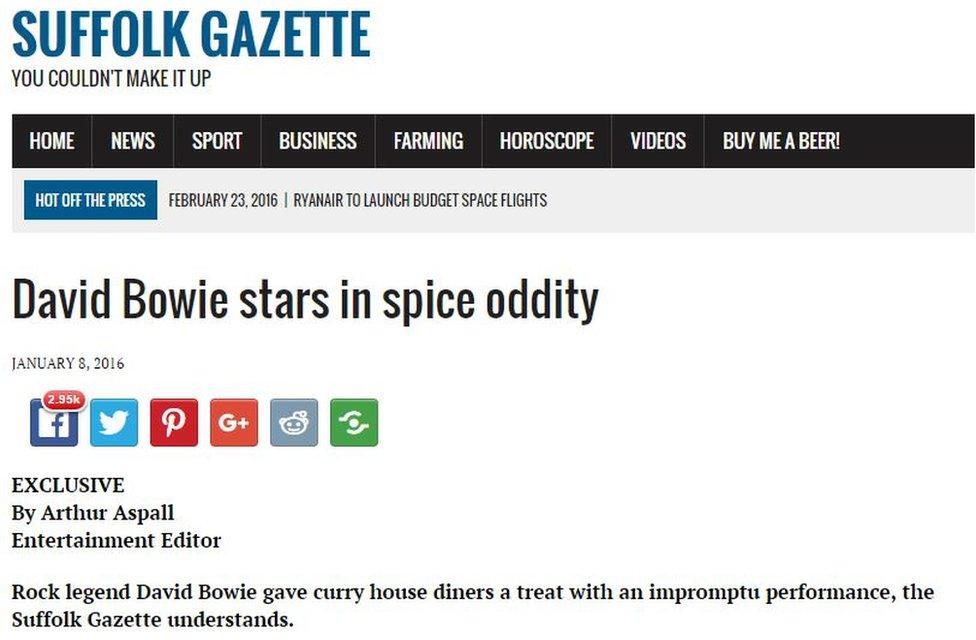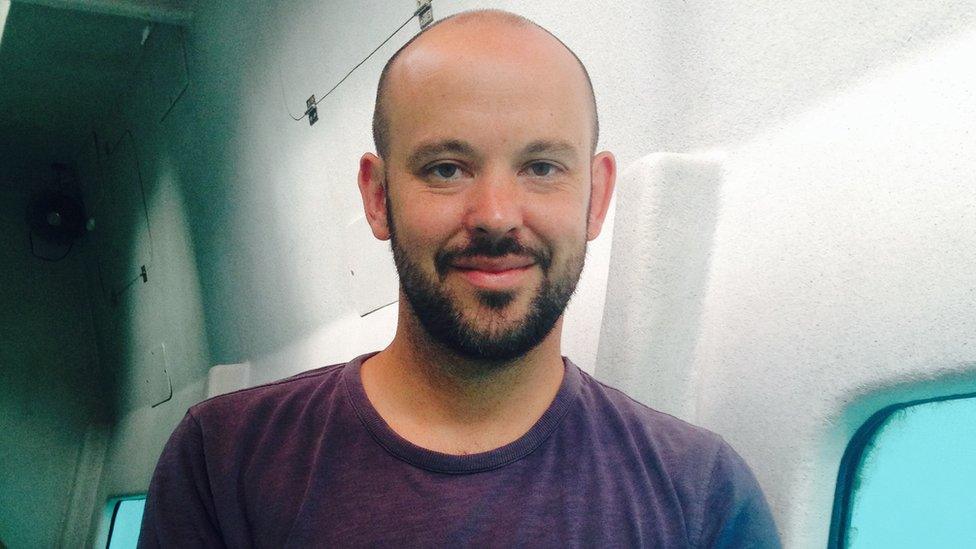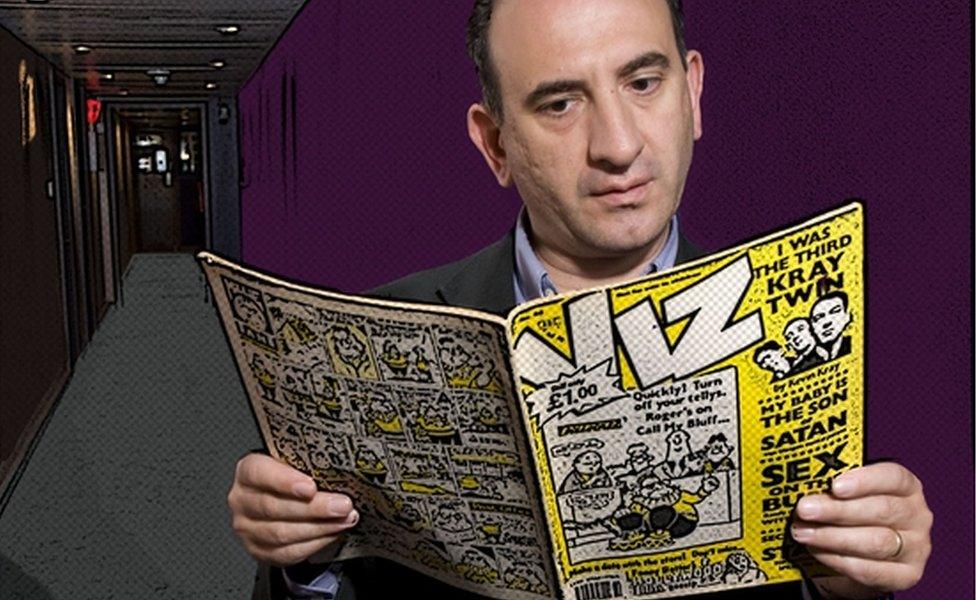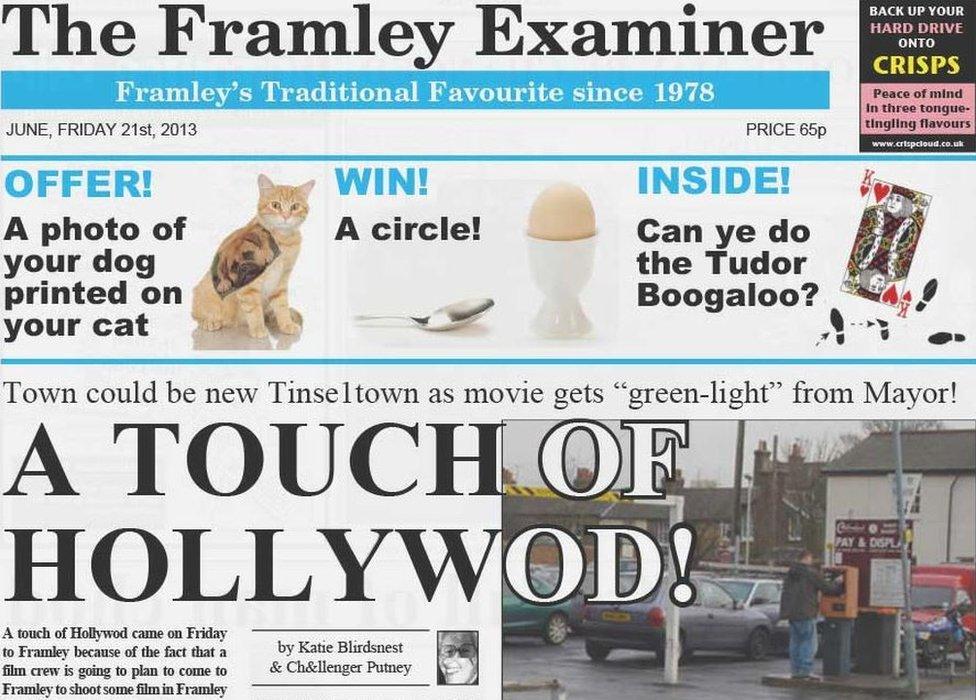The fake stories hitting the headlines
- Published

Suffolk Gazette's story about David Bowie was published three days before his death was announced
On the day of David Bowie's death, a national broadcaster reported the rock star had performed at a Suffolk curry house just days earlier. For some, the fine line between spoof and reality is increasingly hard to detect - so what are the key components of a successful send-up?
During the hours after Bowie's death, journalists scrambled to gather details of the music icon's last days.
When a story emerged about the singer "giving curry house diners a treat, external" in Bungay, Suffolk, a media frenzy briefly ensued.
"I was watching the news, and people started picking up on the curry house story and tweeting it," said Simon Young, a former Sun journalist based in Suffolk.
"As I was watching Sky News, Eamonn Holmes read out about how the Suffolk Gazette was reporting Bowie had performed in a curry house.
"My jaw dropped into my cornflakes. You don't get much bigger than Sky News on breaking coverage of a high profile person's death - and they mentioned my site."
Sadly for Holmes, the Suffolk Gazette is not a genuine newspaper. It is, instead, a spoof created by Mr Young to "satisfy creative desires" and "raise a bit of beer money".
He had written the Bowie article on the singer's 69th birthday, three days before his death was announced, and later put a note on the story to explain.
The episode highlighted the prevalence of one of the internet's growth industries - spoof news - and the pitfalls it can create for its more sober cousin; the actual news media.

Southend News Network was created in October 2015 and has attracted thousands of social media followers
"Morris dancers and blind footballers in mass brawl" cries one headline. "Dartford tunnel closed due to thousands of Kent residents trying to enter Essex illegally" screams another.
These stories might seem ludicrous or plausible, depending on your point of view. Each treads carefully the fine line between reality and ridiculousness, relying on the reader's moment of uncertainty for its satirical punch.
Broadcaster Fraser McAlpine, who wrote a book called Stuff Brits Like, said in recent times it had become increasingly difficult to tell which stories were fake.
"You've got David Cameron and Jeremy Corbyn having their spats in Parliament, making awful jokes. You've got Donald Trump - he's beyond parody - saying the worst possible things.
"News outlets are behaving like spoof sites, and they're making spoof sites look like sensible news."
In the world of spoof news, there are a few big-name players. There is US site The Onion, of course, the granddaddy of all spoof sites, which began publishing online in 1996.
In the UK, websites such as The Poke, The Daily Mash and NewsThump have been offering up spoof news across the nation for more than a decade.
Mr McAlpine theorised that news parodies were about "banding together and cocking a snook at people in power".
"Sometimes spoof news feels like a righteous sword in the side of something you're bothered about, and sometimes it feels like flicking Vs at a policeman - it's a release and a relief."

Editor of The Daily Mash Tim Telling said the internet had changed the game for spoof news
Tim Telling, editor of The Daily Mash, said the internet had played a huge role in what was being published, and who was publishing it.
"The Daily Mash is a kind of DIY thing done by a small group of people," he said.
"As a kid, I was into Viz comics, and there was a spirit in Viz that's also relevant to The Daily Mash - it felt like it was just some guys doing it in a shed, rather than coming through the existing comedy establishment.
"It's a kind of punk ethos - I think Viz used to sell their copies at punk gigs - and that's the kind of thing the internet has allowed to proliferate."

Satire legend Armando Iannucci reads another legend of the form - Viz
Fifteen years ago, a group of friends from Chelmsford, Essex, decided they would harness the power of the internet after seeing the success of The Onion and satirist Charlie Brooker's spoof television listings site TVGoHome.
The Framley Examiner took the form of a newspaper, but was displayed as though each edition had been scanned and uploaded to its website.
The brainchild of Joel Morris, Alex Morris, Jason Hazeley and Robin Halstead, the site was set up in 2001 at a cost of £25.
Headlines included "Local museum to be put in a museum", "New library: the dream is over", "Fluff misery" and "Cycle lane 'not even as long as small cycle'".

"It wasn't a joke about news - it was a joke about the way news was reported"

Joel Morris and Jason Hazeley honed their spoof news craft on The Framley Examiner
For the Framley Examiner, the joke was as much about the stories as it was about how local news media worked.
The site had the look and feel of a real newspaper, but was never intended to be mistaken for one, Mr Morris said - it was pure parody.
"In the beginning, we wrote about stuff that was quite close to reality. As it went on it got much sillier," Mr Morris said.
"It wasn't a joke about news - it was a joke about the way news was reported."
The Framley Examiner's popularity led to a book and launched the comedy-writing careers of Mr Morris and Mr Hazeley, whose credits include That Mitchell and Webb Look, Charlie Brooker's Screenwipe, and a series of spoof Ladybird books.
To make a site seem as authentic as possible, spoof news creators agree the style of writing is key.
The creator of Southend News Network, a site recently officially recognised by Southend Council, said his stories were often compared to those printed by local media.
The Chief Reporter, as he is known, reckons about half of the people who read his stories realise they are fake, with the other half indignantly commenting and sharing his stories on social media.

Spoof success
A Suffolk Gazette story about an old lady getting trapped in a council toilet, external in Felixstowe for four days was picked up by several national newspapers and publications, including The Express, external, The Daily Mirror and The Debrief, external
Former Fifa vice president Jack Warner appeared to be taken in, external by an article from The Onion about the World Cup being held in the USA in May 2015
The Onion's story on North Korean leader Kim Jong Un being the sexiest man alive, external was picked up by a Chinese newspaper, which reprinted satirical comments and a photo gallery
In 1957, an April Fool's Day report by the BBC on Swiss spaghetti crops, external prompted viewers to try to find out where they could purchase their very own spaghetti bush

Suffolk Gazette's creator said his intention was never to trick people into falling for his stories - people believing them was a "happy side effect" which generates hits, rather than the main aim.
"You do get people commenting, saying 'haha, that's hilarious', but then there'll be that one person who says 'I think it's disgusting'.
"Those who are in on the joke get a double kick out of it - you enjoy the moment other people are taken in."
- Published20 February 2016
